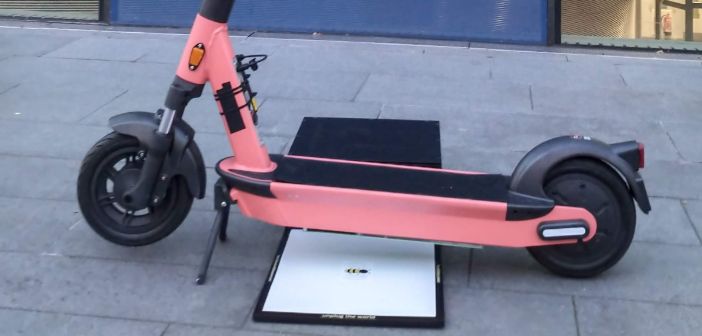Imperial College spin-out Bumblebee Power will provide wireless charging technology for Voi e-bikes and e-scooters.
Bumblebee has retrofitted Voi e-scooters with a receiving unit to trial its wireless charging technology in an effort to save on operational costs, increase access to microbmobility and offer sustainability benefits.
The technology was born out of research at Imperial College’s wireless power lab within the Department of Electrical and Electronic Engineering. To commercialise the wireless power technology, Bumblebee and Voi will complete a series of trials.
The two companies will also work to develop plans for the deployment of charging pads in cities and potential benefits to the e-scooter industry.
According to Bumblebee, compared to current solutions, the wireless charging technology being developed with Voi offers three times the wireless range, has three times the tolerance to misalignment and is three times lighter in weight.
The project will initially look at how electric transmit pads can alleviate infrastructural challenges cities face by implementing easy-to-maintain electric charging hubs.
Bumblebee said it has integrated its ultra-thin, light-weight technology into a Voi e-scooter to demonstrate the practicality of technology. A thin, PCB-based coil and control unit, connected to the grid, which can be attached to the ground, transfers the required power wirelessly to an equally thin and light-weight receive coil and charger unit on the scooter.
The wireless solution is designed to complement existing charging technologies, such as battery-swapping, and enables e-scooter fleets to stay active on roads for longer by providing charging efficiency equivalent to wired charging.
Furthermore, the technology should increase access to e-scooter services in remote areas without easy access to warehouses and incentivise users to park e-scooters in designated areas.
Fredrik Hjelm, CEO of Voi, said: “As more cities adopt electric vehicles and micromobility transport in response to growing concerns over air pollution and congestion, the need for efficient, sustainable, and scalable operations becomes ever greater.
“We are proud to support the research and development that will further these goals by working with a world-leading institution such as Imperial College and Bumblebee Power. We’re aiming for long-term charging solutions that secure the future of micromobility.”





